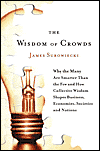Ye Olde Natural Philosophy Discussion Group
Reviews and comments on
James Surowiecki: The Wisdom of Crowds: Why
the Many are Smarter than the Few... [2004]

This book received only mediocre ratings from our group, an average of 5.5 on a scale
of 0 to 10. Both Kirby and Scott felt strongly conflicted about the book, and that
general feeling may have led to its mediocre overall rating.
Kirby said that he really liked some parts of the book, and really disliked other
parts. He said he figured that a majority that reelected Bush can't be very smart, and
that led him to question the premise of the whole book.
Scott hated the bourgeois economic assumptions of the book, the glorification of the
market and of capitalism in general. But he very much appreciated other sections which
brought out some of the various ways in which there is indeed mass wisdom. Scott relates
this to his own fixation on the Maoist theory of the mass line and has promised to write
a review of the book from that unusual perspective. (We'll see if he ever writes it!)
Scott feels that although the author is bourgeois to the core, there are nevertheless
many important things in the book well worth attending to. But to extract those good
things the text often needs to be "reinterpreted". Thus, when Surowiecki talks about
the problems of "group-think" within the leadership of a corporation, Scott prefers to
think about similar sorts of problems—and how to avoid them—within the leadership of
revolutionary parties!
Rosie didn't like the book, and felt that way too much of it was self-evident.
However, she agreed with what she described as the main point of the book, that diversity
of opinions are very important within any group of people if that group hopes to be able
to come to a good decision about some major issue. She added:
|
However, it is important to note what Surowiecki actually means by
"group decision". Individual opinions must be collected independently
of each other—not in a meeting with your boss, your work group, your
social group, or in the presence of a so-called "expert"—in order to
come up with the "wisdom of the crowd". Otherwise, various peer and
group pressures will unduly influence a person's "vote".
|
|
Barbara enjoyed the book, but Kevin S. only skimmed it. "It lost me early on," he
said.
Rich thought the book was pretty interesting. He remarked that he hadn't thought
much about this sort of thing, and found some of it quite counter-intuitive (such as
that it is a good idea to add some contrary views to the mix—even if you know
those specific views are wrong!—before coming to a collective decision). Rich
remarked, however, that Surowiecki's insistence on referring to narrow self-interested
attitudes as "rational" was quite annoying. I think the rest of us very much agree
with that criticism!
Return to our complete list of books.
Return to our Science Group home page.
